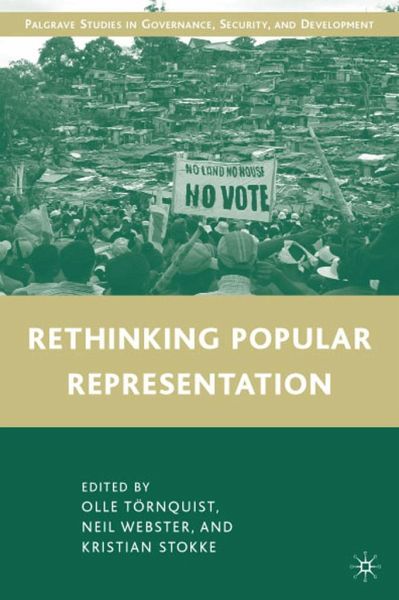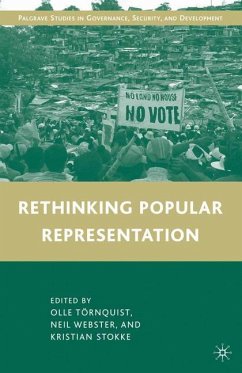
Gebundenes Buch
Rethinking Popular Representation
Versandkostenfrei!
Versandfertig in über 4 Wochen
Weitere Ausgaben:

PAYBACK Punkte
26 °P sammeln!





This book starts out from the deep concern with contemporary tendencies towards depoliticisation of public issues and popular interests and makes a case for rethinking more democratic popular representation. It outlines a framework for popular representation, examines key issues and experiences and provides a policy-oriented conclusion.
GIANPAOLO BAIOCCHI Associate Professor of Sociology and International Studies at Brown University BJÖRN BECKMAN Professor of Political Science at Stockholm University LARS BUUR Senior Researcher at the Danish Institute for International Studies and Research Associate at Wits Institute for Social and Economic Research NEERA CHANDHOKE Professor of Political Science and director of the Developing Countries Research Centre, University of Delhi, India JOS CHATHUKULAM Director of the Centre for Rural Management, Kottayam, Kerala, India. JOHN HARRISS Director of the School for International Studies at Simon Fraser University in Vancouver, British Columbia PATRICK HELLER Associate Professor of Sociology at Brown University PETER P. HOUTZAGER IDS Fellow and visiting scholar at the Centro Brasileiro de Analise e Planejamento (CEBRAP) in São Paulo, Brazil ADRIAN GURZA LAVALLE Fellow researcher and research director at the Brazilian Centre for Analysis and Planning (CEBRAP) NATHAN QUIMPO Associate Professor of Political Science and International Relations at the University of Tsukuba, Japan ELIN SELBOE Holds a PhD in Human Geography from the University of Oslo KRISTIAN STOKKE Professor of Human Geography at the University of Oslo P. K. MICHAEL THARAKAN Vice Chancellor of Kannur University, Kerala, India OLLE TÖRNQUIST Professor of Political Science and Development Research at the University of Oslo GERRY VAN KLINEKN Senior Researcher with the Royal Netherlands Instituteof Southeast Asian and Caribbean Studies (KITLV) NEIL WEBSTER Senior Researcher and Head of the Politics and Government Research Unit at the Danish Institute for International Studies
Produktdetails
- Governance, Security and Development
- Verlag: Palgrave Macmillan / Palgrave Macmillan US / Springer Palgrave Macmillan
- Artikelnr. des Verlages: 978-0-230-62136-7
- 2009 edition
- Seitenzahl: 273
- Erscheinungstermin: 29. Januar 2010
- Englisch
- Abmessung: 211mm x 140mm x 20mm
- Gewicht: 516g
- ISBN-13: 9780230621367
- ISBN-10: 0230621368
- Artikelnr.: 26926175
Herstellerkennzeichnung
Libri GmbH
Europaallee 1
36244 Bad Hersfeld
gpsr@libri.de
"This innovative, insightful exploration of democratic political representation helps clarify why democracy has stagnated in many parts of the developing world and what can be done to revitalize it. The editors have assembled a top-notch cross-regional group of experts andorganized the work around a lucid analytic framework of utility to aid practitioners, civic activists, and scholars." - Thomas Carothers, Carnegie Endowment for International Peace
"Despite waves of democratic upsurge, why does popular representation need re-thinking? Because states are commodified and captured, stripped of democratic politics, and because representation is fractured and 'un-popular.' This book examines how democratic representation can be scaled
"Despite waves of democratic upsurge, why does popular representation need re-thinking? Because states are commodified and captured, stripped of democratic politics, and because representation is fractured and 'un-popular.' This book examines how democratic representation can be scaled
Mehr anzeigen
up. It is a uniquely valuable addition to our understanding of democratic governance." - Barbara Harriss-White, Professor, Department of International Development, Oxford University
"A deeply engaged, engaging, and diverse volume for all of us interested in reducing the democratic deficit in poor countries." - Mick Moore, Professor, Institute of Development Studies
"This is a very significant and high-quality contribution to some pressing debates around the politics of development and democratization in the post-colonial world. These include the important challenges involved in securing not only the inclusion but also the influence of marginal and poor peoples in key decision-making processes that shape their lives,and of the deeper processes of state and citizenship formation that shape these possibilities." - Samuel Hickey, Senior Lecturer, Institute for Development Policy and Management, University of Manchester
"A deeply engaged, engaging, and diverse volume for all of us interested in reducing the democratic deficit in poor countries." - Mick Moore, Professor, Institute of Development Studies
"This is a very significant and high-quality contribution to some pressing debates around the politics of development and democratization in the post-colonial world. These include the important challenges involved in securing not only the inclusion but also the influence of marginal and poor peoples in key decision-making processes that shape their lives,and of the deeper processes of state and citizenship formation that shape these possibilities." - Samuel Hickey, Senior Lecturer, Institute for Development Policy and Management, University of Manchester
Schließen
Für dieses Produkt wurde noch keine Bewertung abgegeben. Wir würden uns sehr freuen, wenn du die erste Bewertung schreibst!
Eine Bewertung schreiben
Eine Bewertung schreiben
Andere Kunden interessierten sich für













